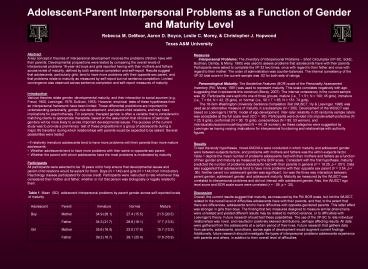Abstract - PowerPoint PPT Presentation
1 / 1
Title:
Abstract
Description:
Adolescent-Parent Interpersonal Problems as a Function of Gender and Maturity Level Rebecca M. DeMoor, Aaron D. Boyce, Leslie C. Morey, & Christopher J. Hopwood – PowerPoint PPT presentation
Number of Views:30
Avg rating:3.0/5.0
Title: Abstract
1
Adolescent-Parent Interpersonal Problems as a
Function of Gender and Maturity Level Rebecca M.
DeMoor, Aaron D. Boyce, Leslie C. Morey,
Christopher J. Hopwood Texas AM University
Measures Interpersonal Problems The
Inventory of Interpersonal Problems Short
Circumplex (IIP-SC Soldz, Budman, Demby,
Merry, 1995) was used to assess problems that
adolescents have with their parents. Participants
were asked to complete the IIP-32 two times, once
with regard to their father and once with regard
to their mother. The order of administration was
counter-balanced. The internal consistency of the
IIP-32 total score in the current sample was .92
for both sets of ratings.
Personological Maturity The Borderline Features
(BOR) scale of the Personality Assessment
Inventory (PAI Morey, 1991) was used to
represent maturity. This scale correlates
negatively with age, suggesting that it
represents this construct (Morey, 2007). The
internal consistency in the current sample was
.82. Participants were split into one of three
groups mature (i.e., T lt 51 N 100 45 girls),
immature (i.e., T gt 64 N 42 25 girls), or
normal (i.e., 50 lt T lt 65 N 151 74 girls).
The 18-item Washington University Sentence
Completion Test (WUSCT Hy Loevinger, 1996) was
used as an alternative measure of maturity in a
subsample (N 200). Development of the WUSCT was
based on Loevingers (1976) model of ego
development. Inter-rater reliability in 20
randomly sample raters was acceptable at the full
scale level (ICC .95). Participants were
divided into impulsive/self-protective (N 25 8
girls), conformist (N 36 15 girls),
conscientious (N 95 53 women), and
individualistic/autonomous/integrated (N 44 24
women), as these categories were suggested by
Loevinger as having varying implications for
interpersonal functioning and relationships with
authority figures.
Abstract A key concept in theories of
interpersonal development involves the problems
children have with their parents. Developmental
propositions were tested by comparing the overall
levels of interpersonal problems 18-year-old boys
and girls reported having with their mothers and
fathers across levels of maturity, defined by
both sentence completion and self-report. Results
suggest that adolescents, particularly girls,
tend to have more problems with their opposite
sex parent, and that problems relate to maturity
as measured by self-report but not
sentence-completion. Limited convergence was
observed across sentence-completion and
self-report measures of maturity.
- Introduction
- Various theories relate gender, developmental
maturity, and their interaction to social acumen
(e.g., Freud, 1900 Loevinger, 1976 Sullivan,
1953). However, empirical tests of these
hypotheses from an interpersonal framework have
been limited. These differential predictions are
important for understanding personality,
gender-role development, and parent-child
relations, and may have implications for
psychotherapy. For example, therapist gender is
often a variable that is considered in matching
clients to appropriate therapists, based on the
assumption that clinicians of particular genders
will be more likely to evoke important
developmental issues. The purpose of the current
study was to provide a preliminary test of these
propositions in a group of adolescents during a
major life transition during which relationships
with parents would be expected to be salient.
Several possibilities were tested - If relatively immature adolescents tend to have
more problems with their parents than more mature
adolescents - Whether adolescents tend to have more problems
with their same or opposite-sex parent - Whether the parent with whom adolescents have
the most problems is moderated by maturity - Participants
- All participants were selected to be 18 years old
to help ensure that developmental issues and
parent-child relations would be salient for them.
Boys (N 149) and girls (N 144) from
Introductory Psychology classes participated for
course credit. Participants were instructed to
rate whomever they considered their mother and
father, whether or not that person was
biologically or legally related to them.
Results To test the study hypotheses, mixed ANOVA
s were conducted in which maturity and adolescent
gender were between-subjects factors, and
problems with mothers and fathers was the
within-subjects factor. Table 1 depicts the mean
number of problems adolescents had with their
mothers and fathers as a function of their gender
and maturity as measured by the BOR scale.
Consistent with the first hypothesis, maturity
predicted the number of problems adolescents had
with their parents in general (F 19.26, p lt
.001). Data also suggested that adolescents tend
to have more problems with their opposite sex
parent (F 3.54, p lt .06). Neither parent nor
adolescent gender was significant, nor was the
three way interaction between parent gender,
adolescent gender, and adolescent maturity.
Maturity as measured by the WUSCT was unrelated
to interpersonal problems and did not interact
with adolescent gender. Also, the WUSCT ego level
score and BOR scale score were unrelated (r
-.09, p gt .20). Discussion Overall, the current
results suggest that maturity, as measured by the
PAI BOR scale, but not the WUSCT, related to the
overall level of difficulties adolescents have
with their parents, and that, to the extent that
there are differences, adolescents tend to have
difficulties with opposite-gendered parents. This
latter effect was stronger in girls than boys.
The finding that two measures designed to measure
similar phenomena were unrelated and yielded
different results may be related to method
variance, or to difficulties with Loevingers
theory. Future research should test these
possibilities. The use of the IIP-SC to rate
individual relationships was novel, and resulted
in positively skewed distributions, perhaps
affecting results. All data were gathered from
the adolescents at a certain period of their
lives. Future research that gathers data from
parents, adolescents, and others, across ages of
development would augment current findings.
Additionally, future research should investigate
the types of interpersonal problems adolescents
experience with parents and others, in addition
to their overall level of difficulties.
Table 1. Mean (SD) adolescent interpersonal
problems by parent gender across self-reported
levels of maturity.































